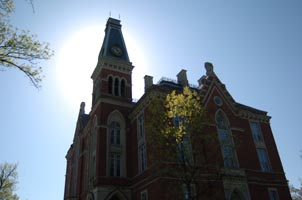Columnist William Raspberry Discusses Generational Change at DePauw Convocation
September 23, 1988
 September 23, 1988, Greencastle, Ind. - "In the 1960s the dominant question was 'How do I change the world,'" syndicated newspaper columnist William Raspberry said at DePauw University today. In his many years speaking on college campuses, Raspberry says, "The lectures haven't changed that much, but the Q&A periods have, and they are instructive." (at left: Raspberry meeting with DePauw students)
September 23, 1988, Greencastle, Ind. - "In the 1960s the dominant question was 'How do I change the world,'" syndicated newspaper columnist William Raspberry said at DePauw University today. In his many years speaking on college campuses, Raspberry says, "The lectures haven't changed that much, but the Q&A periods have, and they are instructive." (at left: Raspberry meeting with DePauw students)
While the students of the 60s "wanted to talk about their role in the social and civil rights movements, the effectiveness of various forms of protest (and) the reasons old people like me were so slow to buy into the radical politics of the day that would transform the world. If their interest was journalism, as it often was, they wanted to know what a journalist ought to be doing to change the world."
Raspberry, who featured DePauw President Robert G. Bottoms in a column last November, continued, "By the 1970s the question was, 'Will the world make it?' The worries were over Vietnam, over the bomb, and miltarism in general, and cancer and urban sprawl and the draft and intergenerational warfare over such issues as the legalization of pot. If the world is in as much trouble as it obviously is, they seemed to be saying, we either have to worry about everything or else worry about nothing."
 The columnist concluded, "By the beginning of the '80s the questions had taken a decidedly pragmatic turn. No longer was it 'How do I make the world change?' or 'Will the world make it?' but 'How will I make it in the world?' The younger brothers and sisters of the students who used to ask me how journalism could be made a force for social change now wanted to know how I got my job, and what it paid, and whether it was a good idea to major in journalism, and whether it was better to go to graduate school or hire on at a small paper."
The columnist concluded, "By the beginning of the '80s the questions had taken a decidedly pragmatic turn. No longer was it 'How do I make the world change?' or 'Will the world make it?' but 'How will I make it in the world?' The younger brothers and sisters of the students who used to ask me how journalism could be made a force for social change now wanted to know how I got my job, and what it paid, and whether it was a good idea to major in journalism, and whether it was better to go to graduate school or hire on at a small paper."
Since 1966, William Raspberry's columns have been syndicated twice weekly to newspapers around the nation. He has a reputation for independent thought on national and international issues and has received numerous awards for his writing. In 1965, he was named Journalist of the Year by the Capitol Press Club for his coverage of the Los Angeles Watts riot. Raspberry was nominated for a Pulitzer Prize in 1982.
Back